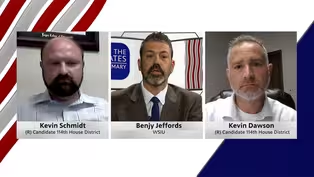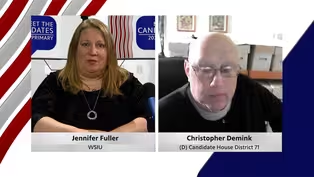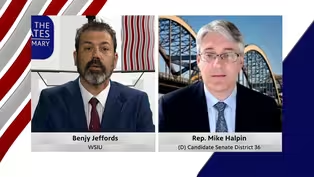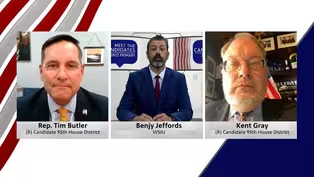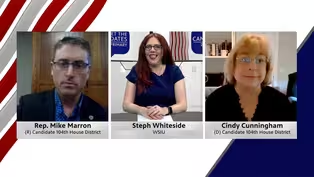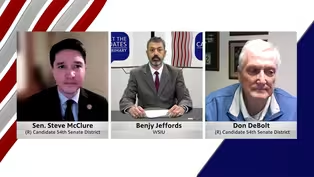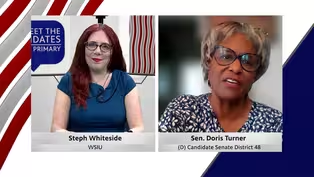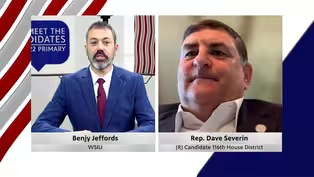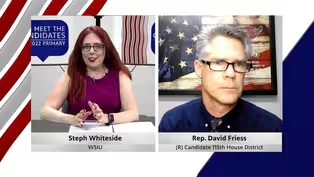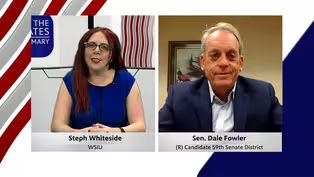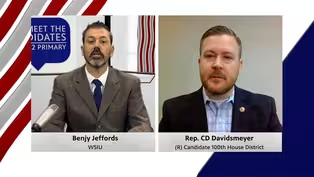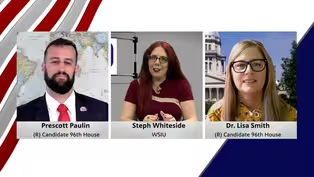Meet the Candidates
12th U.S. Congressional Seat Primary Candidate Forum
6/17/2022 | 25m 21sVideo has Closed Captions
Joshua Qualls and Chip Markel, running for the 12th U.S. Congressional Seat.
Ahead of the June primary, WSIU sat down with Joshua Qualls and Chip Markel, running for the 12th U.S. Congressional Seat.
Problems playing video? | Closed Captioning Feedback
Problems playing video? | Closed Captioning Feedback
Meet the Candidates is a local public television program presented by WSIU
This series is produced in partnership with the League of Women Voters
Meet the Candidates
12th U.S. Congressional Seat Primary Candidate Forum
6/17/2022 | 25m 21sVideo has Closed Captions
Ahead of the June primary, WSIU sat down with Joshua Qualls and Chip Markel, running for the 12th U.S. Congressional Seat.
Problems playing video? | Closed Captioning Feedback
How to Watch Meet the Candidates
Meet the Candidates is available to stream on pbs.org and the free PBS App, available on iPhone, Apple TV, Android TV, Android smartphones, Amazon Fire TV, Amazon Fire Tablet, Roku, Samsung Smart TV, and Vizio.
Providing Support for PBS.org
Learn Moreabout PBS online sponsorshipMore from This Collection
Meet the Candidates features interviews with candidates running for Illinois state, House and Senate races. Guests will discuss key issues impacting Illinois voters such as the economy, the environment, education and public health. This series is produced in partnership with the League of Women Voters.
114th Illinois House District Primary Candidate Forum
Video has Closed Captions
Dr. Kevin Schmidt and Kevin Dawson, running for the 114th House District. (25m 57s)
71st House District Primary Candidate
Video has Closed Captions
Ahead of the June primary, WSIU talked with Christopher Demink, running for the 71st House (21m 35s)
36th Senate District Primary Candidate Forum
Video has Closed Captions
WSIU talked with 36th Senate District candidate Representative Mike Halpin. (26m 29s)
95th Illinois House District Primary Republican Candidates
Video has Closed Captions
Representative Tim Butler and Kent Gray, running for the 95th House District. (26m 58s)
104th Illinois House District Primary Candidates
Video has Closed Captions
104th House District candidates Representative (R) Mike Marron and (D) Cindy Cunningham. (26m 49s)
54th Illinois Senate District Primary Republican Candidates
Video has Closed Captions
54th Illinois Senate District Primary Republican Candidates forum. (25m)
48th Illinois Senate District Primary Democrat Candidates
Video has Closed Captions
48th Illinois Senate District Primary Democrat Candidates forum. (26m 46s)
116th Illinois House District Primary Republican Candidates
Video has Closed Captions
116th Illinois House District Primary Republican Candidates forum. (25m 9s)
115th Illinois House District Primary Republican Candidates
Video has Closed Captions
115th Illinois House District Primary Republican Candidates forum. (23m 14s)
59th Illinois Senate District Primary Republican Candidate
Video has Closed Captions
WSIU interviews Senator Dale Fowler from the 59th Senate District. (27m 29s)
100th Illinois House District Primary Republican Candidates
Video has Closed Captions
WSIU interviews candidate C.D. Davidsmeyer, running for the 100th House seat. (26m 9s)
96th Illinois House District Primary Republican Candidates
Video has Closed Captions
Candidates Prescott Paulin and Dr. Lisa Smith, running for the 96th House seat. (28m 45s)
Providing Support for PBS.org
Learn Moreabout PBS online sponsorship(upbeat music) (upbeat music continues) - This is "Meet The Candidates" with primary candidates for the 12th Congressional District.
I'm Steph Whiteside.
WSIU Public Broadcasting and the League of Women Voters are pleased to host today's forum.
The rules are simple.
Each candidate will have 60 seconds to answer the question, and should not mention their opponent in their response.
Joining us today are Joshua Qualls and Chip Markel, both running for the Democratic spot on the ballot.
Representative Mike Bost, who is unchallenged for the Republican spot, was unable to attend this forum.
Thank you both so much for joining us.
- Thank you.
- Thank you, Steph.
- Mr. Qualls, we'll start with you.
What is your number one priority if elected?
I know it can be hard to narrow it down, but please try to stick to just one.
- Well, I have many goals, but the one thing that's bothered me for years, and not just from a Republican's administration, but for Democrats.
I'd like to introduce a resolution that changed the power of the presidential pardon, where they can't pardon anybody from their administration, that was tried and found guilty.
It's just not right, I think.
And I think that the American people on both sides, are tired of seeing justice not be done.
It's like we're in the age of unaccountability.
- Thank you, Mr. Qualls.
Mr. Markel?
- Mine is, the democracy, saving the democracy.
After the insurrection on January the 6th, and then the number of Republicans that voted against certifying the presidential election.
The lawsuit that would throw out millions of votes in five different states before the election.
And now our Republican opponent has filed a lawsuit in Chicago, that would not count mail-in ballots after Election Day.
And a lotta those would be military ballots.
You know, the IRS will accept our tax returns, as long as they're postmarked by midnight on the 15th of April.
But they're saying that's not good enough for ballots.
They're attacked the right to vote.
- Okay, thank you.
And we'll start again with you this time, Mr. Markel.
What would make you an effective lawmaker if elected?
- My history, I have a history of, well, first I joined the military, and was in the Navy for four years.
And I received an honorable discharge.
And then I ended up being hired by the Illinois Department of Corrections, where I joined the union.
I was union president of an arts correctional center for almost seven years.
Over my career in corrections, I negotiated four contracts with the state.
We had the Department of Corrections.
It was such a violent place at that time, that something had to be done.
And I was the union president.
We were getting officers stabbed by inmates.
So something had to be done, and I initiated the push for getting a supermax prison built in Illinois.
It took us two and a half years of lobbying Democrats, Republicans, and the governor.
Talking with groups that were opposed to it.
But like I said, it took us two and a half years to do it.
And we accomplished that.
- Thank you, and Mr. Qualls, same question to you.
- Could you repeat the question?
- Yes.
What would make you an effective lawmaker if elected?
- Well, I'm a very good student of the constitution.
I have a passion for my fellow Americans.
And I know that I can make a difference, not only with my ideas, but willing to listen to the people, to get their ideas out there.
To have their concerns from whether it be food, to guns, to the border.
I'm willing to listen to people and make a difference for the people.
- All right.
And thank you.
And we'll start with you for the next question.
The pandemic really exposed disparities in education, and I know that education is primarily a state issue, but what would your priorities be from a federal standpoint.
For meeting the needs of students and families?
- I think we need to get federal funding out there to help with the students, because the biggest number one concern for me is how many students have committed suicide from this?
There was a rise in depression.
We had that before the pandemic, but...
I've talked to many teachers and this is their biggest concern of how depressed the students are.
And I think that this could be a bipartisan issue that we could work on in helping, and making sure that there's no more kids killing themselves, that they have somebody they can talk to.
- Thank you, Mr. Markel, same question.
- We need an equitable way.
(indistinct buffering) School districts Schools in Illinois are... they don't receive as much funding as wealthier districts in the north.
We need to find a way to equalize that.
Another thing is... another thing the pandemic showed, that we need wifi, capable wifi throughout Illinois.
In the Southern part of the state, and the rural areas.
That was a big problem, when students tried to learn over Zoom.
A lot of families had two or three kids, that were trying to get on at one time, to do their learning.
But because of inadequate wifi, they were unable to do that.
So that industry needs to be (indistinct) - All right.
Thank you.
And we'll start again with you.
So we can't talk about governing, without talking about budgets.
So what are three things, that you would prioritize when looking at the federal budget?
- The first thing would be, a fair and equitable tax system.
I pay my taxes.
I pay sales tax.
I pay real estate tax.
I pay gas tax.
But the wealthy seem to have loopholes to where they can get out of paying income tax.
Some people say because well, they pay corporate tax.
Everybody else has to pay multiple taxes.
So we need a fair system to where everybody pays.
I'm not saying that we gouge the rich and the wealthy, for taxes, but they just have to pay their fair share.
Control spending.
You know, we have our deficit, our deficit is running rampant.
We have to control spending.
- Thank you, and Mr. Qualls?
- Could you repeat that question?
I'm sorry.
- Yes, it's okay.
Looking at budget priorities, right?
Always going to be an issue in any level of government.
So what would be three things that you would prioritize when thinking about the budget?
- Well, I think we have the greatest military in the world, but I question how much we put into that, where we could put it elsewhere.
I think we need to look at the border.
And just not be racist to some people on it.
We do have a situation with drugs and human trafficking, and that's something that we need to look at.
Just not make it into such a racist deal, making sure that we have enough funding to do infrastructure.
As Mr. Markel said, during this pandemic, wifi was such an issue.
I have two kids, and we struggled with wifi here for at least a month, till they finally fixed the solution.
So, if we could help prioritize in the areas where we make sure our children are safe, make sure the country's safe.
I think this is a key thing.
And going along with budgets as well, I think that we need to have it, where the people decide whether or not the people in Congress and the Senate can get a raise, instead of them voting themselves.
- All right.
Thank you.
And we'll start with you again.
So now that we've talked about your budget priorities, then comes the next part.
What are some things where you think cuts should be made?
- Well, I think if I was elected and can actually look at the actual budget where it goes into the military.
That's an area that I would like to look into.
I mean, as a civilian, I could say, well I don't think we should do this, but I don't actually know the numbers.
And that's something I definitely would like to look into, and see where we can maybe prioritize it, such as the Southern border.
'Cause I mean, drugs is a very big issue, that concerns so many and the human trafficking problem.
So, that would definitely be an area where I would look into.
- Thank you.
And Mr. Markel?
- Again, going back to the tax system, we need to look at closing tax loopholes, to where someone like Jeff Bezos, doesn't pay any income tax.
That's ridiculous that the wealthy are able to get away with that.
There was another issue, but I forgot what it was.
But the tax system is the big issue.
You know, we have to make that fair and equitable for everybody.
- All right.
Thank you.
And we will start with you again, moving on to some recent events.
Although the economy is recovering from the early stages of the pandemic, inflation is also on the rise.
What would you do to help Illinoisans who are finding their paychecks don't stretch as far as they did even a couple months ago?
- The other thing that I was gonna mention, was, we need to look at government subsidies to companies when some of these companies are making, seven to $8 billion profit in a quarter, and they're still receiving government subsidies.
That's not right, they don't need that.
The government subsidies were put in place back in the '30s to provide stability for companies that were considered to be national security companies.
So that's what the... That's how that came about.
But right now, when you have companies, that are making billion dollars a quarter at profit, they don't need government subsidies anymore.
- All right.
Thank you.
And Mr. Qualls, what would you do to help address inflation?
- Sorry, there's that tring.
Just give me a second.
Apologize.
Well, the inflation problem, let's call it for what it really is.
I think it's just corporate greed.
Right now in the house, they have a bill that's gonna go after these companies for making too much profit.
And if it passes and goes to the Senate, the question is will that bill go to the Senate floor?
What we need to do is get out to vote, and get more Democrats in so we can get stuff out there.
And as for other problems in that nature, we need to raise the minimum wage.
There are too many states where people struggle, and they live from paycheck to paycheck, and it's gotta stop.
- All right.
Thank you, Mr. Qualls, and we'll be starting again with you.
Many people are pushing for more renewable energy, especially with the rising price of oil.
At the same time, parts of Illinois and the rest of the country have fossil fuel supplies that could provide energy for many years to come.
What would you do to ensure a steady and affordable supply of energy?
- Well, we need to look at what we have, and decide what's next route of moving forward.
I mean, here in Illinois, we're gonna be getting three nuclear stations for the power for Southern Illinois.
I support it to a point, but I'm still cautious 'cause you hear the word nuclear, and you think Chernobyl, or Japan, when they had their problem.
I'm big on solar power throughout our state.
I know there's issues here where there's not enough wind in some areas.
But if we could look into better solutions for that.
But I think we need to look at situations like Texas, where their whole grid got wiped out.
And I think throughout the country, we should focus on, not only the cleanest form of energy, but making sure a lot of these grid lines are underground and in safer matter, and have backup, because you don't need people being six weeks without power while their Congressperson or Senator goes off to a warm island while they're all freezing.
- Thanks Mr. Qualls, Mr. Markel?
- We need to come up with a comprehensive energy plan, and that is a combination of solar power, wind power and fossil fuel power.
We're never going to get to a 100% renewable energy plan.
So, I think we need to continue with clean coal research.
You know, if United States gets to a situation, where we don't have a lot of coal power plants, that still affects, or that could still affect, a lot of countries around the world.
Third world countries that are dependent on that kind of power.
So if we can continue clean coal research, make it as clean as possible, to where we can end up sharing that technology with other countries that would help the globe.
Solar power is another thing.
My wife and I put solar powered on our house two years ago.
So nine and a half months out of the year, we don't have a power bill.
That would be a push of mind to go to give residential people, the solar power to save money on their part.
And there are a couple other things.
- All right, your time is up, unfortunately, but thank you.
And we'll start with you again, Mr. Markel.
COVID 19 really changed the way people look at healthcare and public health.
What would you do to make sure the country is prepared to handle future public health emergencies?
- One thing that the pandemic did show us, was that our supply chain is an issue, in these kind of situations.
When we're dependent on China for everything from personal protection equipment, for medical staff, for pharmaceutical drugs.
When we run out of those things, because China is not able to produce 'em, to me, we need to treat our supply chain as a national security issue.
We need to bring that stuff back to the United States, onshore, to where if we have a pandemic like this again, we have the capability of providing that stuff in country, instead of waiting for three or four months before it comes from another country.
So I would treat our supply chain as a national security issue.
- Thanks Mr. Markel, Mr. Qualls?
- Well, we can't have a president throw out a plan for a pandemic ever again.
That just was the most chaotic thing.
We have to listen to our experts, and not encourage people to put bleach in their body.
That's a big thing but, I've noticed in small areas, small towns, I'm sure this is everywhere but, we need them not only just for handicap accessibility, we need to make a requirement that all these stores have automatic doors.
I mean, not only would that prevent people having to touch the doors with a common cold, it would help preventing this.
And then if we could get stores to put in ultraviolet lights on their carts, and have better cleaning, areas where we have to touch.
If we could avoid having to do that, that would be a big step of moving forward.
And then there's just the issue, state by state, where they're not following the pandemic guidelines.
You had people wearing their mask where it was having their nose exposed.
I mean, these are issues that could have solved a lot of problems.
- Thank you, Mr. Qualls, and we will continue with you.
So gun violence continues to be a problem nationwide.
What would you do to address the violence and how do you balance that with second amendment rights?
- Well, we live in a country where we have the opportunity, where we can change the rules, and it's time to change this old rule.
That second amendment, was whenever there was muskets.
The founding fathers had no idea that we would have nuclear weapons and weapons that we do today.
And, we don't need AR15s for one.
That's the biggest issue.
It's the biggest cause of killing people.
And it's ridiculous.
People are scared the death to go out in public, go to church, go to school.
Parents are hugging their kids.
I mean, we have to do this.
Now I understand there are hunters out there, and there's people that want handguns.
But the thing is, most of these people that got ahold of these weapons in most of these mass shootings, they passed most of the rules with the exception of a few.
And then somewhere down the road, they snapped.
We have an issue with mental illness, but then we have it where the Republican party wants to take away from healthcare.
We gotta have proper healthcare, so people can have the right sense to buy a gun or not buy a gun.
We do it with cars.
It's harder to open up a taco stand, than it is to get a gun.
- Thanks Mr. Qualls, Mr. Markel?
- You know, there is a (indistinct) whether the AR15 needs to be banned.
I don't think that's the direction we should go.
If all of the AR15s were gone, then these people would use a different weapon.
The first mass shooting I remember was a place in California, I believe was a fast food restaurant where the person used a shotgun.
Then the semi-automatic pistol became the popular weapon.
The AR15 is the popular weapon now.
If you want an AR15 and you want to shoot at a target or a wild boar at 250 yards, then yeah that's the gun to use.
But when you go into a closed situation, like these shooters are doing, go into classrooms, or grocery stores, a semiautomatic pistol, is gonna do as much damage to a young body or anybody, as the AR15 is gonna do.
We need red flag laws, we need universal background checks.
We need to age limit on these high capacity weapons.
And we need to address mental health.
We have to provide the funding.
The Republicans are always talking about that, but yet they're the ones who turn around and they cut budgets that provide mental health services.
- Thank you, Mr. Markel, and we'll start with you again.
So, criminal justice reform, you sort of touched on is also a hot topic.
Do you support changes to the system, including alternative sentencing options like drug courts, and what changes would you make to ensure safety, while making sure rehabilitation remains an option?
- Well, you know, like I said, the red flag laws, the universal background checks, the age limit, mental health issues.
If we can identify people who are in crisis, before they get to the breaking point, like if they're bullied at school.
When someone sees that, we have the capability of giving them mental health services, then maybe they won't snap like they do.
Universal background checks.
That's gonna help the flow of illegal guns into Chicago.
And I'm a gun owner, and every gun I bought has come from a dealer.
And that's never, none of this stuff here would restrict my ability to buy another gun if I chose to do so.
The loopholes for gun shows, that needs to be closed.
There's nothing wrong with waiting for three days, doing a background check, having red flag laws, raising the age limit, but providing mental health services as well.
- Thank you, and Mr. Qualls again to you on criminal justice reform.
- Now, are you just referring to for the guns or in general for other subjects?
- In general for guns, drugs, any crimes really.
- Well, we have an issue throughout the country where it seems there's certain areas where I think certain races are getting arrested when they shouldn't be.
We need to have a better system for the drugs, 'cause there's people that just, they need to go to a rehab, they don't need to go be stuck in some prison where they're getting raped, beat up, and maybe even learning that worse crime.
And I'm against, fully against, and if we get elected, I would like to get rid of these prisons, where like you have prisoners making Victoria's Secret, where they're cutting meats.
I mean, we got rid of slavery for a reason.
And then these companies, instead of letting the American people work there, they're using slaves.
I mean, that's exactly what it is.
And I think we need to have checks and balances on our judges.
I mean, you have judges that aren't even elected, and they're gonna decide over this Roe versus Wade thing.
I think, that you have a two party system, where both parties nominate their judge, and then we have a special election.
And let the people decide who they want to be that judge.
- Thank you.
And for you again.
Recent events have shown just how much Americans can be impacted by global politics, with things like supply chain shortages, and rising prices due to the pandemic, and fighting in Ukraine.
What would you do to try and help minimize the disruption of events like these on your constituents, and well, all Americans really?
- Well, we need to make, made in America, mean something again.
And we need to really renegotiate our trade deal with China.
Why we're trading with a communist country is beyond me.
I mean, Nixon opened that Pandora's box, and it's hard to get closed but, there's other options that we can look into.
The problem is, is if we have enough people to vote on it.
If we lose the House and we lose any more seats in the Senate, it won't matter if me or Chip were elected, and we have the greatest idea.
It might not even reach the House floor.
- Thank you.
And Mr. Markel?
- I wanna touch base on something, that was said here just a minute ago.
About job inmates working in prison.
I'm retired from the Illinois Department of Corrections, and we had a correctional industries.
The inmates who worked in industries, provided material for other prisons.
T-shirts, underwear, socks, meat from the farm.
They were paid for this stuff.
This is not slave labor.
It gave them something to do.
It kept their hands busy, instead of sitting in their cell idle all day.
So that's a misconception.
You know, I worked in the Department of Corrections for almost 27 years and I know this.
So I just wanted to correct that.
- Okay.
So we are onto our last question and Mr. Markel, we will start with you.
What would you do to help ensure fair elections, and access to voting for all Americans?
- I think we need to, pass the John R. Lewis voting rights bill.
To restrict somebody, to cut down the number of places that they can vote, to make access harder, is affecting their right to vote.
Every American citizen has the right to vote, and I think that's what we needed to get to.
And the first thing would be to pass it, would be to pass the John R. Lewis voting rights act.
- Thank you.
And Mr. Qualls?
- Well I think every voting time in whatever state it is, should be a national holiday, so everybody can get out to vote.
I would agree with that John Lewis Act, it needs to be implemented.
But I think we need to have some form of an ID card that they can scan to make sure there isn't voter fraud.
'Cause none of us wanna have a person voting more than once and have an issue of that.
And there's several other steps that can be looked into, it's just whether or not we can have a bipartisan deal.
It comes down to, bipartisanship, or if we get enough Democrats to get it done.
That's always been the issue.
And if elected, I promise to do that for the people.
- All right.
Well thank you.
And thank you both so much for joining us today.
- Thank you.
- Thank you.
You have a good day.
- All right.
And thank all of you for tuning in, for "Meet the Candidates" for the 12th congressional district with Democratic candidates, Joshua Qualls and Chip Markel, for WSIU, I'm Steph Whiteside.
(upbeat music)

- News and Public Affairs

Top journalists deliver compelling original analysis of the hour's headlines.

- News and Public Affairs

FRONTLINE is investigative journalism that questions, explains and changes our world.












Support for PBS provided by:
Meet the Candidates is a local public television program presented by WSIU
This series is produced in partnership with the League of Women Voters

